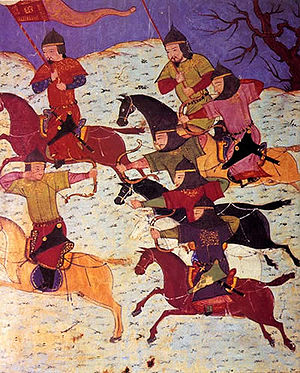| Battle of Kalka River | |||||||
|---|---|---|---|---|---|---|---|
| Part of the Mongol invasion of Kievan Rus' | |||||||
 Mongol horse archers | |||||||
| |||||||
| Belligerents | |||||||
|
Mongol Empire Brodnici |
Principality of Kiev Principality of Galicia-Volhynia Principality of Chernigov Principality of Smolensk Cumans | ||||||
| Commanders and leaders | |||||||
|
Jebe Subutai Ploscânea |
Mstislav Mstislavich Mstislav III (POW) Daniel of Galicia (WIA) Mstislav II Svyatoslavich † Khan Köten | ||||||
| Strength | |||||||
| 20,000–23,000 men[2][3] | 8,000–80,000[4][5][6][7][8][9] | ||||||
| Casualties and losses | |||||||
| Unknown | Around 60–90% of Coalition force killed[10] | ||||||
The Battle of the Kalka River[a] was fought between the Mongol Empire, whose armies were led by Jebe and Subutai, and a coalition of several Rus' principalities, including Kiev and Galicia-Volhynia, and the Cumans under Köten. They were under the joint command of Mstislav the Bold and Mstislav III of Kiev. The battle was fought on May 31, 1223 on the banks of the Kalka River in present-day Donetsk Oblast, Ukraine, and ended in a decisive Mongol victory.
Following the Mongol invasion of Central Asia and the subsequent collapse of the Khwarezmian Empire, a Mongol force under the command of generals Jebe and Subutai advanced into Iraq-i Ajam. Jebe requested permission from the Mongol emperor, Genghis Khan, to continue his conquests for a few years before returning to the main army via the Caucasus. While waiting for Genghis Khan's reply, the duo set out on a raid in which they attacked the Kingdom of Georgia. Genghis Khan granted the duo permission to undertake their expedition, and after making their way through the Caucasus, they defeated a coalition of Caucasian tribes before defeating the Cumans. The Cuman Khan fled to the court of his son-in-law, Mstislav Mstislavich of Galicia, whom he convinced to help fight the Mongols. Mstislav the Bold formed an alliance of the Rus' princes including Mstislav III of Kiev.
The combined Rus' army defeated the Mongol rearguard at first. The Rus' pursued the Mongols, who were in a feigned retreat, for several days, which spread out their armies. The Mongols stopped and assumed battle formation on the banks of the Kalka River. Mstislav the Bold and his Cuman allies attacked the Mongols without waiting for the rest of the Rus' army and were defeated. In the ensuing confusion, several other Rus' princes were defeated, and Mstislav of Kiev was forced to retreat to a fortified camp. After holding out for three days, he surrendered in return for a promise of safe conduct for himself and his men. Once they surrendered, however, the Mongols slaughtered them and executed Mstislav of Kiev. Mstislav the Bold escaped, and the Mongols went back to Asia, where they joined Genghis Khan.
- ^ Curta, Florin (31 August 2006). Southeastern Europe in the Middle Ages, 500-1250. Cambridge University Press. p. 406. ISBN 978-0-521-81539-0.
- ^ de Hartog, Genghis Khan: Conqueror of the World, p. 118.
- ^ Cite error: The named reference
R100-Gwas invoked but never defined (see the help page). - ^ Cite error: The named reference
John Fennell pp. 66-8was invoked but never defined (see the help page). - ^ D.G. Khrustalev. Rus and the Mongol invasion (20–50's of XIII century). SPb: Eurasia, 2013. pp. 85–86
- ^ Khrustalev, p. 416
- ^ Sverdrup, p. 206
- ^ Cite error: The named reference
R98-Gwas invoked but never defined (see the help page). - ^ Spencer C. Tucker. A Global Chronology of Conflict: From the Ancient World to the Modern Middle East. 23.12.2009. p. 426
- ^ The Novgorod First Chronicle, translated by R. Michell, and N. Forbes, London 1914.
Cite error: There are <ref group=lower-alpha> tags or {{efn}} templates on this page, but the references will not show without a {{reflist|group=lower-alpha}} template or {{notelist}} template (see the help page).